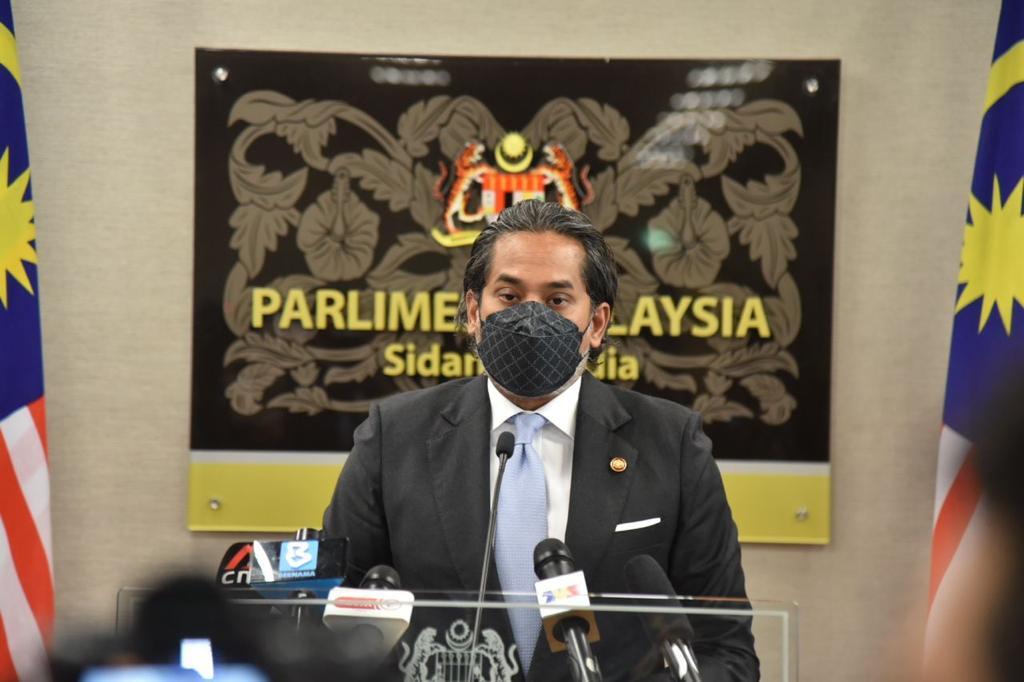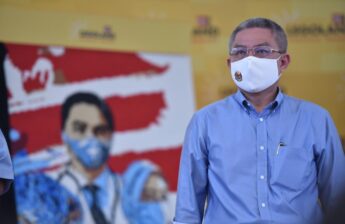KUALA LUMPUR March 9 – Khairy Jamaluddin today sought to defend the reopening of borders and relaxation of domestic Covid-19 restrictions on April 1, even though the Malaysian epidemic has yet to pass its peak.
The health minister said Malaysia’s health care capacity is still able to cope with surging Covid-19 cases and rising mortality — albeit at a much slower rate than infections — during the Omicron wave.
“As of now, although the number of cases are rising, the situation is still under control. We are still confident that we can continue shifting to an endemic phase on April 1,” Khairy mentioned in a press meet today.
“We hope that we’ll pass the peak at the end of this month, but it could be more than 30,000, more than 40,000 [cases]. It really depends on the mobility of the people and whether or not they continue to stick with the SOPs (standard operating procedures) that we still have until the first of April.”
CodeBlue highlighted yesterday that Malaysia’s Covid-19 wave has yet to peak and that Covid-19 deaths are at a four-month high, with Covid-19 ventilated and intensive care unit (ICU) cases at a three month high, even as the government announced the April 1 reopening of borders and removal of restrictions like physical distancing in religious places of worship and capacity limits for indoor events.
Khairy stressed today that the April 1 transition to the endemic phase involves shifting away from legal enforcement of Covid standard operating procedures (SOPs) to community and personal measures to protect one’s health.
“So we don’t just rely on interventions, SOPs, and legislation, but we move from government intervention to community solidarity, individual responsibility, with a government that continues to care for you,” Khairy said.
“This transition to an endemic phase is very important because it is an exit strategy to allow us to return to a near-normal life after more than two years of facing Covid-19.”
As of March 7, the complete Covid-19 vaccination rate for the adult population in the country was 98.7 per cent, while adult booster coverage was at 64 per cent.
“The Omicron variant causes milder symptoms and complications of the disease compared to the previous Delta variant, especially for those with high levels of immunity to the SARS-CoV-2 virus as a result of vaccination or immunity after infection,” said the health minister.
According to Khairy, the mortality rate to date during the Omicron variant wave that started in January this year is much lower compared to the Delta variant wave that occurred in late June to October 2021.
The utilisation of special beds for Covid-19 cases, such as non-critical beds as well as ICU beds, showed an increase from the third to ninth epidemiological week in 2022, but Khairy claimed that the situation is still under control.
“The overall utilisation of non-critical beds including for Covid-19 and non-Covid-19 cases is at 70 per cent, while the overall use of ICU beds for Covid-19 and non-Covid-19 cases is at 59 per cent.”
Khairy called this phenomenon a “decoupling” effect, comparing the current Covid-19 situation during the Omicron wave (February until March 2022) that is seeing record-high daily infections surpassing 33,000, with the peak of the Delta variant in August 2021.
“The sharp increase in the number of daily Covid-19 cases is now not followed by a sudden increase for hospitalisation, use of ICU, use of breathing aids. or even cases of death due to Covid-19.”
As of March 8, the utilisation of non-critical beds for Covid-19 cases, including suspected cases, was 69 per cent, while the Covid-19 ICU bed utilisation rate was 42 per cent. The ventilator utilisation rate for Covid-19 patients was 25 per cent.
“MOH is of the view that although there is a slight increase in terms of BID (brought-in-dead) and the case fatality rate (CFR), it is still under control. The admission levels in hospitals and Covid-19 low-risk quarantine and treatment centres (PKRC) are still below the capacity that we feel is reasonable and we can monitor.”
MOH also considered another indicator — the percentage of home quarantined Covid-19 patients whose condition deteriorates.
From the first (January 2 to 8) to the ninth (February 27 to March 5) epidemiological week this year, the average number of cases undergoing monitoring at home with symptom deterioration and who were referred to PKRC and hospitals were 1.3 per cent and 0.5 per cent respectively.
Khairy highlighted the rise in Covid-19 deaths lately and said that only 12 per cent of those who have died had received a booster jab.
“So it is extremely important to increase the administration of booster shots to be able to protect us.”
Khairy said that the CFR for those aged above 80 is at seven per cent. Of them, 91 per cent had comorbidities. Among those with underlying health conditions, 61 per cent suffered from hypertension.
“What I’m trying to say here is, we know the characteristics of the patients among the Covid-19 death cases,” he said.
“That is why we are trying to increase awareness among the public, especially when they have family members with these characteristics, they should bring them to get treatment as soon as possible.”
Khairy also said that the government will continue to administer Covid-19 booster doses and spur the vaccination programme for children, in addition to increasing treatment options for Covid-19 patients with new medication like the Covid-19 oral antiviral, Paxlovid, that will arrive at the end of this month.
The government will also monitor positive cases and recovering Covid-19 patients via the virtual Covid-19 Assessment Centre (CAC).
“The government will continue to treat and protect people although we enter into an endemic phase,” said Khairy.
“I would like to urge the public to receive their booster dose before April 1, especially if you are above 60 years of age or Sinovac recipients. It is compulsory for these groups of people to receive a third dose of Covid-19 vaccine to retain their fully vaccinated status.”







